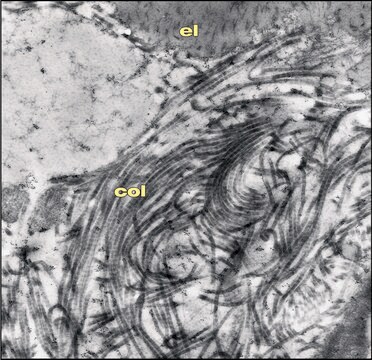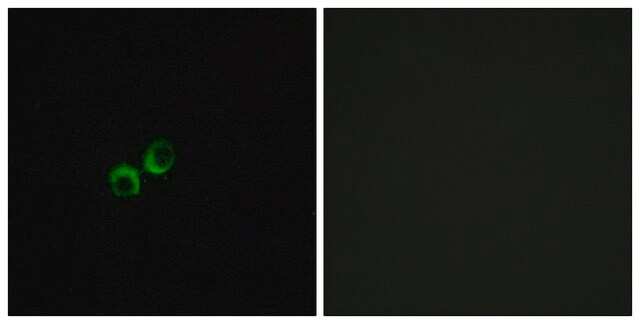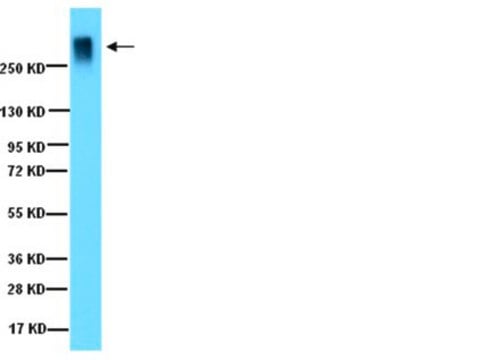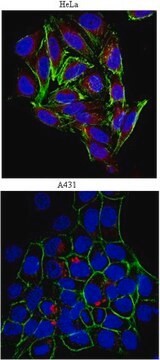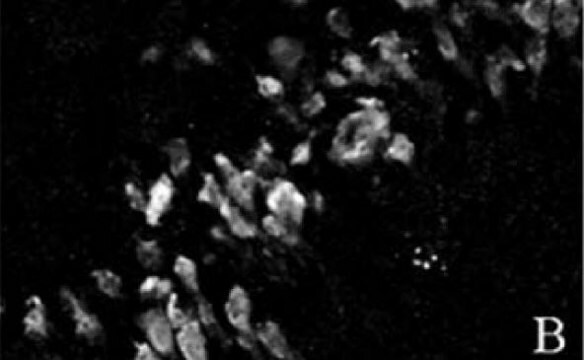AB5932
Anti-Potassium Channel KvLQT1 Antibody, CT
Chemicon®, from rabbit
别名:
IKs producing slow voltage-gated potassium channel subunit alpha KvLQT1, KQT-like 1, Voltage-gated potassium channel subunit Kv7.1, kidney and cardiac voltage dependent K+ channel, potassium voltage-gated channel, KQT-like subfamily, member 1, slow delay
登录查看公司和协议定价
所有图片(2)
About This Item
分類程式碼代碼:
12352203
eCl@ss:
32160702
NACRES:
NA.41
推荐产品
生物源
rabbit
品質等級
抗體表格
affinity isolated antibody
抗體產品種類
primary antibodies
無性繁殖
polyclonal
純化經由
affinity chromatography
物種活性
human
物種活性(以同源性預測)
mouse (based on 100% sequence homology), rat (based on 100% sequence homology)
製造商/商標名
Chemicon®
技術
immunohistochemistry: suitable
western blot: suitable
NCBI登錄號
UniProt登錄號
運輸包裝
wet ice
目標翻譯後修改
unmodified
基因資訊
human ... KCNQ1(3784)
一般說明
KvLQT1(Kv7.1) is a voltage-gated potassium channel protein coded for by the gene KCNQ1. This protein is present in the cell membranes of cardiac muscle tissue and in inner ear neurons among other tissues. KvLQT1 can form heteromultimers with two other potassium channel proteins, KCNE1 and KCNE3 and in heart cells is required for the repolarization phase of the cardiac action potential. Mutations in the gene are associated with hereditary long QT syndrome, Romano-Ward syndrome, Jervell and Lange-Nielsen syndrome and familial atrial fibrillation, lead to a defective KvLQT1 protein and several forms of inherited arrhythmias known as Long QT syndrome, Short QT syndrome, and Familial Atrial Fibrillation.
特異性
This antibody recognizes Potassium Channel KvLQT1 protein.
免疫原
Epitope: C-terminus
KLH-conjugated linear peptide from the C-terminus of human KvLQT1.
應用
Anti-Potassium Channel KvLQT1 Antibody, C-terminus detects level of Potassium Channel KvLQT1 & has been published & validated for use in IH & WB.
Immunohistochemistry Analysis: 1:300 dilution from a previous lot detected Potassium Channel KvLQT1 in human myocardium tissue.
/Western Blotting Analysis: 2 μg/mL of this
antibody detected KvLQT1 in 10 μg of human
heart tissue lysate.
Optimal working dilutions must be determined by end user.
/Western Blotting Analysis: 2 μg/mL of this
antibody detected KvLQT1 in 10 μg of human
heart tissue lysate.
Optimal working dilutions must be determined by end user.
Research Category
Neuroscience
Neuroscience
Research Sub Category
Ion Channels & Transporters
Ion Channels & Transporters
品質
Evaluated by Western Blot in human heart tissue lysate.
Western Blot Analysis: 2 µg/ml of this antibody detected KvLQT1 in 10 µg of human heart tissue lysate.
Western Blot Analysis: 2 µg/ml of this antibody detected KvLQT1 in 10 µg of human heart tissue lysate.
標靶描述
~ 72 kDa Observed
外觀
Affinity purified
Purified rabbit polyclonal in buffer containing 0.1 M Tris-Glycine (pH 7.4, 150 mM NaCl) with 0.05% sodium azide.
儲存和穩定性
Stable for 1 year at 2-8°C from date of receipt.
分析報告
Control
Human heart tissue lysate
Human heart tissue lysate
其他說明
Concentration: Please refer to the Certificate of Analysis for the lot-specific concentration.
法律資訊
CHEMICON is a registered trademark of Merck KGaA, Darmstadt, Germany
免責聲明
Unless otherwise stated in our catalog or other company documentation accompanying the product(s), our products are intended for research use only and are not to be used for any other purpose, which includes but is not limited to, unauthorized commercial uses, in vitro diagnostic uses, ex vivo or in vivo therapeutic uses or any type of consumption or application to humans or animals.
未找到合适的产品?
试试我们的产品选型工具.
儲存類別代碼
12 - Non Combustible Liquids
水污染物質分類(WGK)
WGK 1
閃點(°F)
Not applicable
閃點(°C)
Not applicable
Lipopolysaccharide-induced inflammation attenuates taste progenitor cell proliferation and shortens the life span of taste bud cells.
Cohn, ZJ; Kim, A; Huang, L; Brand, J; Wang, H
BMC Neuroscience null
Kcnq1 contributes to an adrenergic-sensitive steady-state K+ current in mouse heart.
Bjorn C Knollmann, Syevda Sirenko, Qi Rong, Alexander N Katchman, Mathew Casimiro et al.
Biochemical and biophysical research communications null
The KCNE2 potassium channel ancillary subunit is essential for gastric acid secretion.
Roepke, TK; Anantharam, A; Kirchhoff, P; Busque, SM; Young, JB; Geibel, JP; Lerner, DJ; Abbott, GW
The Journal of Biological Chemistry null
Fu Liang Ng et al.
British journal of pharmacology, 162(1), 42-53 (2010-09-16)
KCNQ-encoded voltage-gated potassium channels (K(v) 7) have recently been identified as important anti-constrictor elements in rodent blood vessels but the role of these channels and the effects of their modulation in human arteries remain unknown. Here, we have assessed KCNQ
Dominik Gonnissen et al.
International journal of nanomedicine, 11, 5221-5236 (2016-10-30)
Within the last years, progress has been made in the knowledge of the properties of medically used nanoparticles and their toxic effects, but still, little is known about their influence on cellular processes of immune cells. The aim of our
我们的科学家团队拥有各种研究领域经验,包括生命科学、材料科学、化学合成、色谱、分析及许多其他领域.
联系技术服务部门